Consejo Belize Presents
The Pirates of The Caribbean
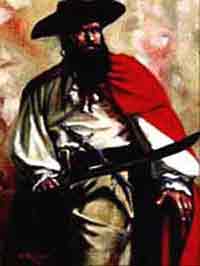
Quoted from LIFE AMONG THE PIRATES by DAVID CORDINGLY: "Since piracy is simply armed robbery on the high seas, and has been accompanied by a catalog of cruelties and atrocities, it is surprising that it should have acquired a comparatively glamorous image. Part of the explanation may be found in the exotic locations where many of the pirates operated, of Coral islands, tropical waters, lagoons and sandy beaches fringed with coconut palms. There is also the romance of the sea.
"Another part of the explanation may be the anarchic nature of piracy. Most people are condemned to lives of monotony. Year in and year out, workers in offices, factories and large and small companies follow the same daily routine. They catch the same bus or train, they drive along the same route and suffer the same delays and traffic jams. They endure hours of boredom, often doing a job which gives them little or no satisfaction. They come home to face the predictable problems of family life or the loneliness of a flat or apartment in some dreary location. What greater contrast could there be with a life or piracy?
"The pirates escaped from the laws and regulations which govern most of us. They were rebels against authority, free spirits who made up their own rules. They left behind the grey world of rain swept streets and headed for the sun.
We imagine them sprawled on sandy beaches with a bottle of rum in one hand and a lovely woman by their side, and a sleek black schooner moored offshore waiting to carry them away to distant and exotic islands.
"There is a less obvious explanation for the attraction of the pirates. In his lengthy poem, 'The Corsair', Lord Byron created a pirate who was aloof and alien, a man of loneliness and mystery with a cruel past and an untamed spirit. As all women know and some men can never understand, the most interesting heroes of literature and history have been flawed characters.
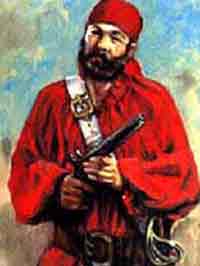
"The real world of the pirates was harsh, tough and cruel. They were more likely to drown in a storm or suffer death by hanging than they were to live out their days in luxury on the riches they had plundered.
"The fact is we want to believe in the world of the pirates as it has been portrayed in the adventure stories, the plays and the films over the years. We want the myths, the treasure maps, the buried treasure, the walking the plank, the resolute pirate captains with their cutlasses and earrings, and the seamen with their wooden legs and parrots. We prefer to forget the barbaric tortures and the hangings, and the desperate plight of men shipwrecked on hostile coasts. For most of us the pirates will always be romantic outlaws living far from civilization on some distant sunny shore."
The Pirates you will learn about:
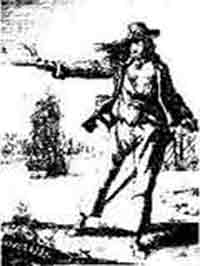
Anne Bonny was born Anne Cormac in County Cork, Ireland, the daughter of a servant woman, Mary Brennan, and her employer, lawyer William Cormac...

Blackbeard, born Edward Teach, was the most notorious pirate in the history of seafaring. With a beard that almost covered his face...
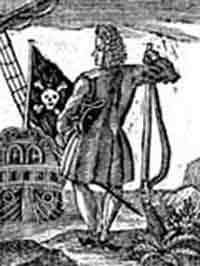
Major Stede Bonnet was commonly known as the "Gentleman Pirate." His background was not that of a typical pirate and he was not that entirely successful...
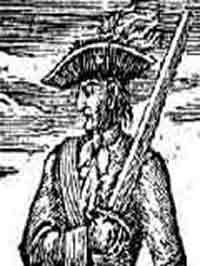
Calico Jack's short but eventful career can be summarized into just a few words, he first achieved prominence when he deposed Charles Vane...
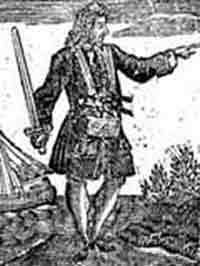
Charles Vane's pirating career had several somewhat bizarre twists but he was successful and well known at the time, and in particular in 1718...
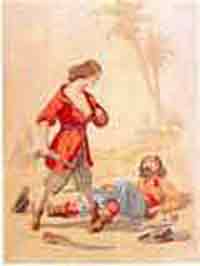
Mary Read was born in London, England in the late seventeenth century to the wife of a sea captain...

Bartholomew Roberts: was the most successful and menacing pirate in the Americas. He and is crew captured an incredible total of more than 400 ships..
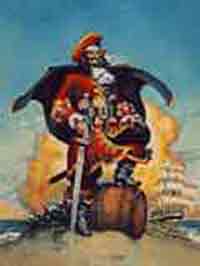
Sir Henry Morgan: The seventeenth century was a turbulent one with almost continual warfare between European nations...
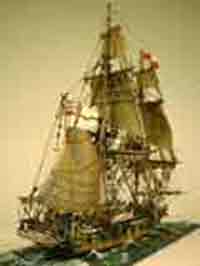
Pirate Ships: Any ship can be a pirate ship. All you need are pirates! And the will to do what no one else would think of!

John Phillips was traveling to Newfoundland on a ship that was taken by the pirate brigantine, "Good Fortune"...
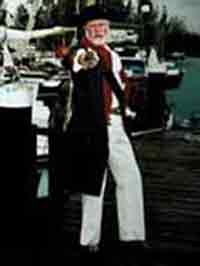
Captain Sinbad built and launched the MEKA II in 1967, and since he has earned the respect of many high seas adventurers for his sail training...
Types of Pirates
Buccaneer:
Initially hunter's of cattle and pigs on the Island of Hispaniola, the Buccaneers got their name from the meaning of the French word "boucan" (which means barbecue), as they were frequently seen barbecuing their meat on grills (they learned this form of cooking from the Arawak Indians).
The buccaneers were driven out by the Spanish, and the persecuted hunters banded with groups of runaway slaves, deserters, and other's who hated the Spanish and sought vengeance on their vessels. The word buccaneer soon became common, and by the 17th century was used to describe pirates and privateers who had bases in the West Indies.
Corsair
The term refers to pirates or privateers who operated in the Mediterranean. The most recognized corsairs were from the Barbary Coast of North Africa (European crusaders named their Muslim enemies (Barbary Corsairs?). These corsairs were authorized by their governments to prey upon the shipping lanes of Christian countries. The Maltese Corsairs led the fight against the Turks, being led by the Knights of St. John. The Maltese Corsairs initially fought for religion, but after a while the rewards of piracy grew to greater appeal. Soon the Maltese Corsairs were full-fledged pirates, with no interest in religious ideals.
Privateer
A privateer was a pirate who by commission or letter of marquee from the government was authorized to seize or destroy a merchant vessel of another nation. The privateer was used as a cheap means of weakening the enemy by frequenting shipping routes (avoiding the costs related to the maintenance and creation of a navy).
In theory no Privateer with a letter of marquee could be charged with piracy, since it was recognized by international law. However, it was not uncommon for privateers to be charged and prosecuted for piracy by hostile nations. All occurrences of vessels captured by privateers had to be brought before an Admiralty Court where they were tried to ensure that their plunder was legal game.
Code of Conduct on a Pirate Ship:
Anyone who has watched Disney's "Pirates of the Caribbean" knows all about "The Pirate Code", laid down by the pirates Morgan and Bartholomew. The idea of a single code for all Pirates is a modern bit of Pirate Mythology that first surfaced with the release of that excellent Disney film.
The rules of each Pirate Captain were clearly stated to each member of the crew in the form of "articles". There was little ambiguity about acceptable behavior among pirates on a typical pirate ship. When a rule was breached, the crew was often without pity or remorse in punishing a guilty crew member. Although in cases of particularly useful pirates such as skillful fighters, exceptions were inevitably made.
Articles from the last voyage of the Pirate ship "Revenge" commanded by John Phillips:
- Every man shall obey civil Command; the Captain shall have one full share and a half in all Prizes; the Master, Carpenter, Boatswain and Gunner shall have one Share and quarter.
- If any man shall offer to run away, or keep any Secret from the Company, he shall be marooned with one Bottle of Powder, one Bottle of Water, one small Arm and shot.
- If any Many shall steel any Thing in the Company, or game, to the Value of a Piece of Eight, he shall be marooned or shot.
- If at any Time we should meet another Mariner (that is Pyrate) that Man that shall sign his Articles without the Consent of our Company, shall suffer such Punishment as the Captain and Company shall think fit.
- That Man that shall strike another whilst these Articles are in force, shall receive Mose's Law (that is 40 stripes lacking one) on the bare Back.
- That Man that shall snap his Arms, or smoke Tobacco in the Hold, without a cap to his Pipe, or carry a Candle lighted without a Lanthorn, shall suffer the same Punishment as in the former Article.
- That Man that shall not keep his Arms clean, fit for an Engagement, or neglect his Business, shall be cut off from his Share, and suffer such other Punishment as the Captain and the Company shall think fit.
- If any Man shall lose a Joint in time of an Engagement he shall have 400 pieces of Eight; if a limb 800.
- If at any time you meet with a prudent Woman, that Man that offers to meddle with her, without her Consent, shall suffer present Death.
